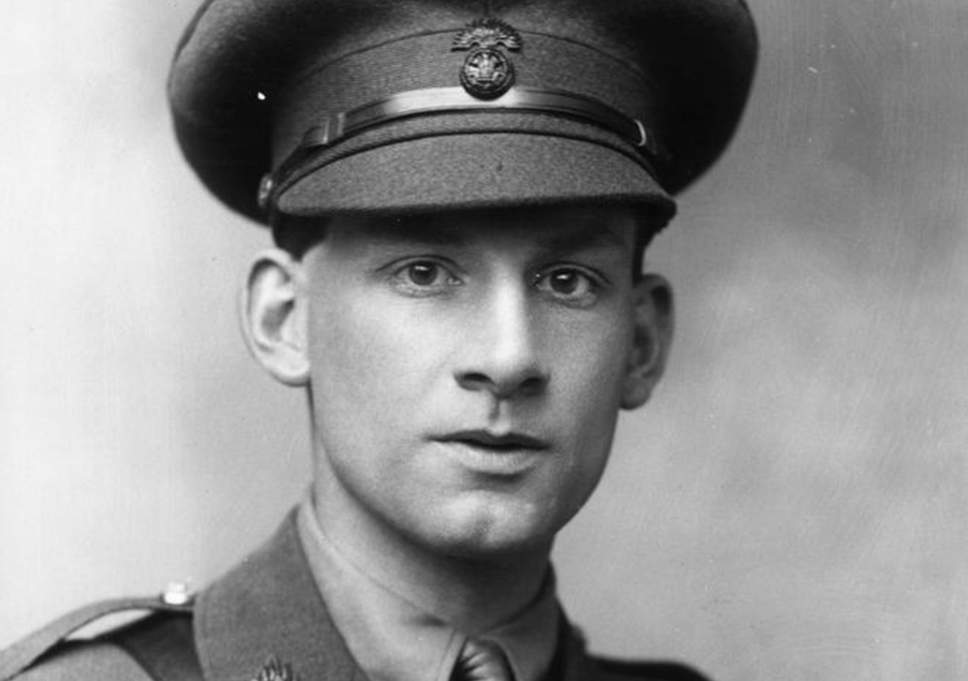
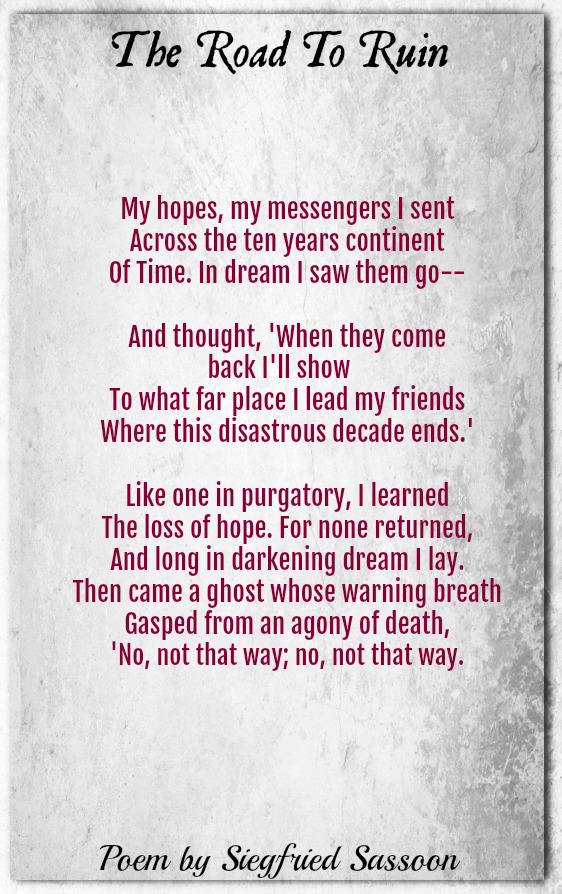
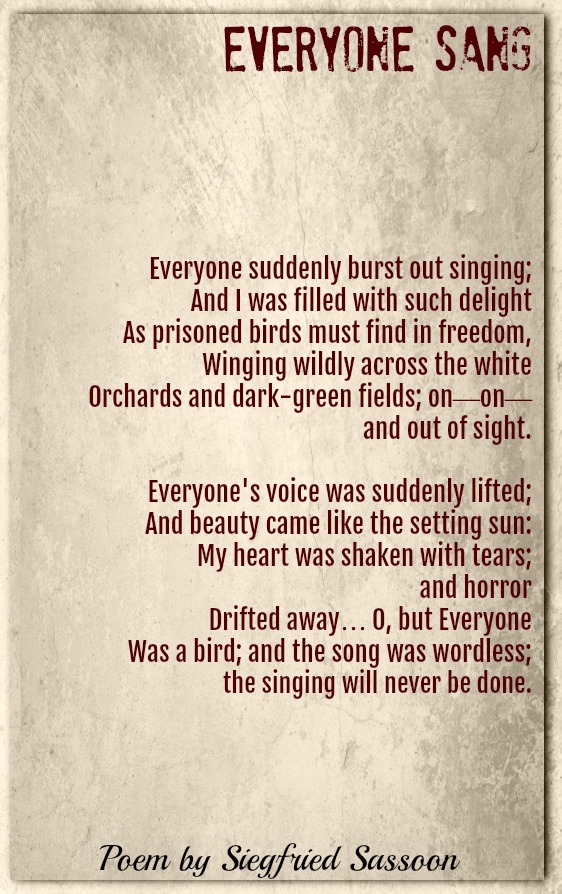
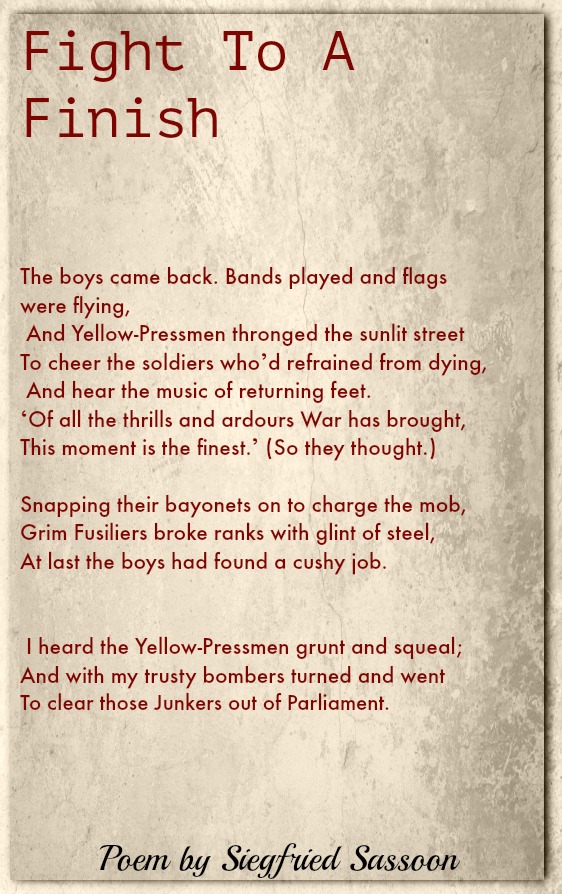
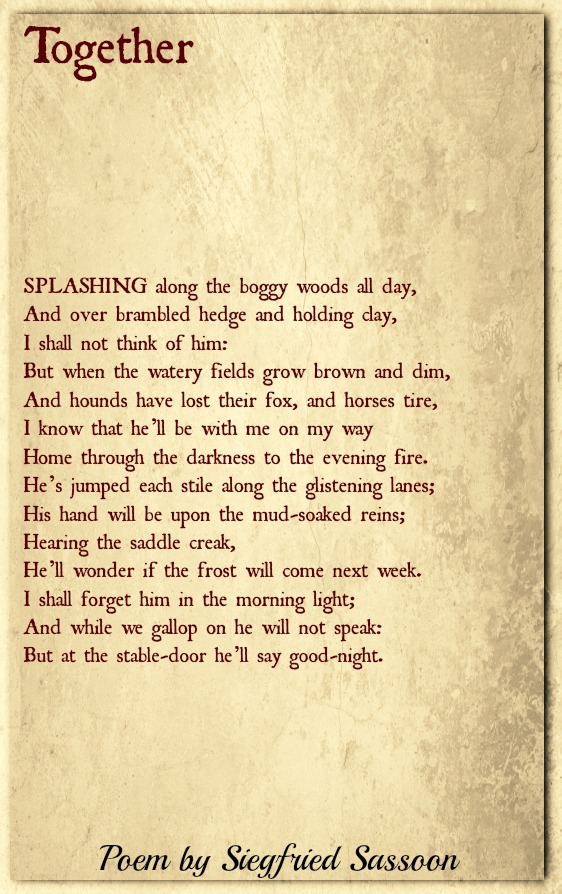
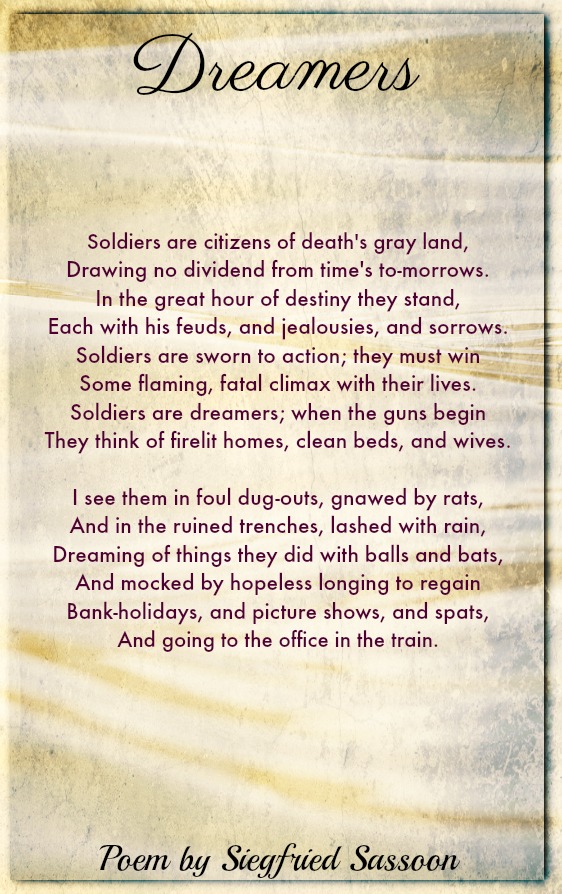
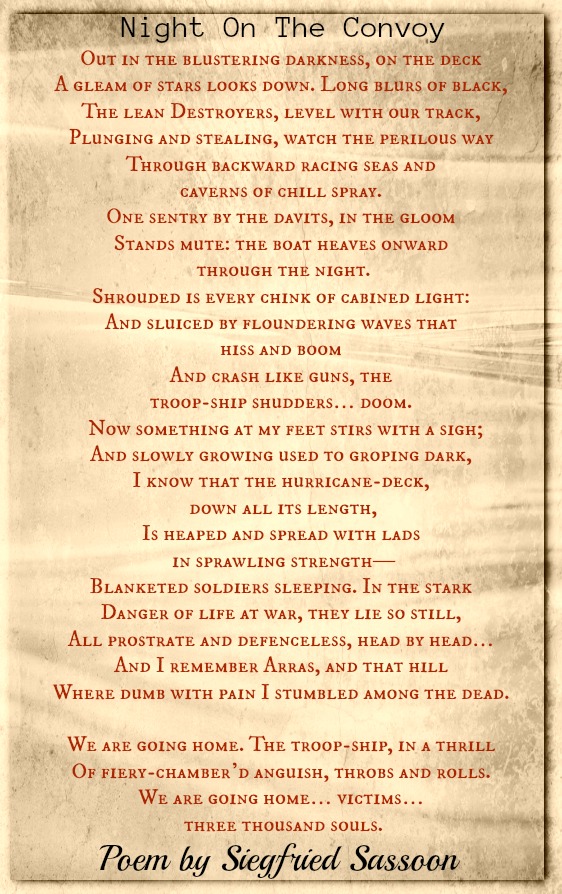
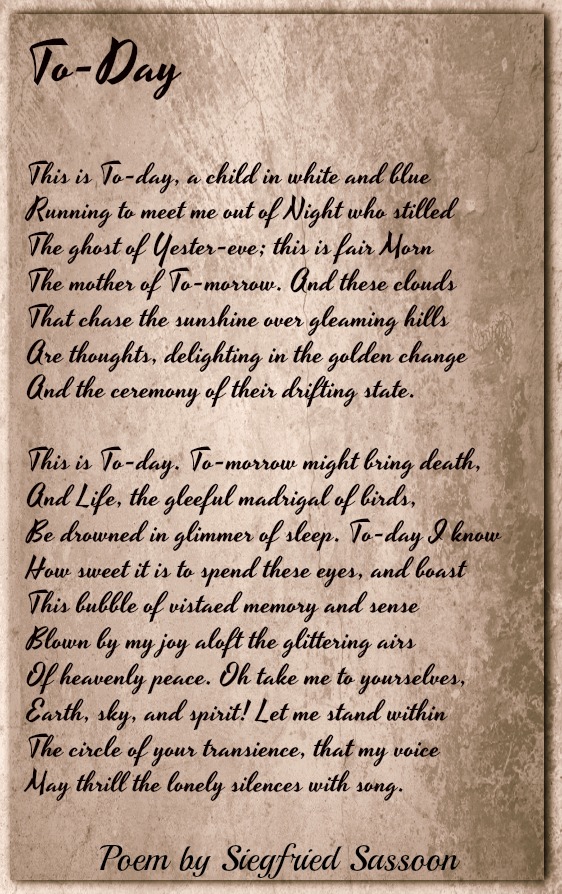
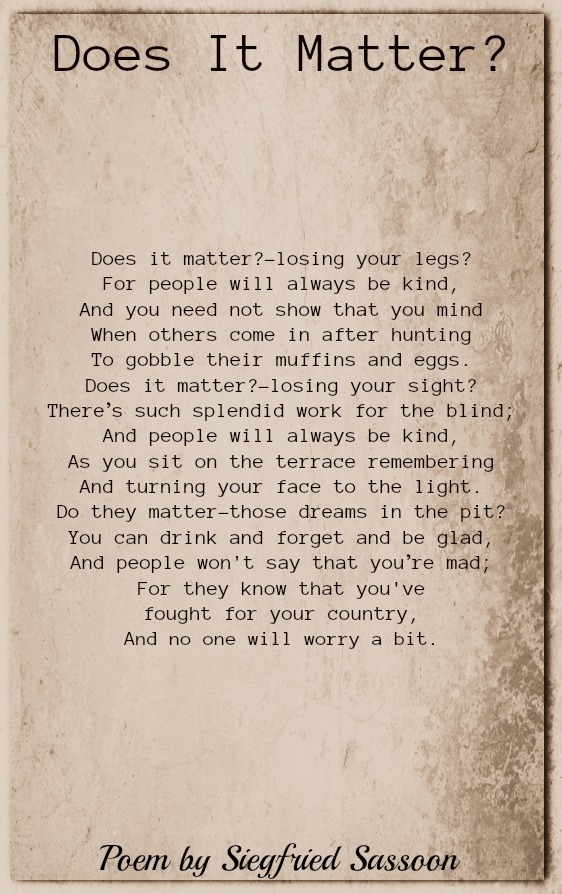
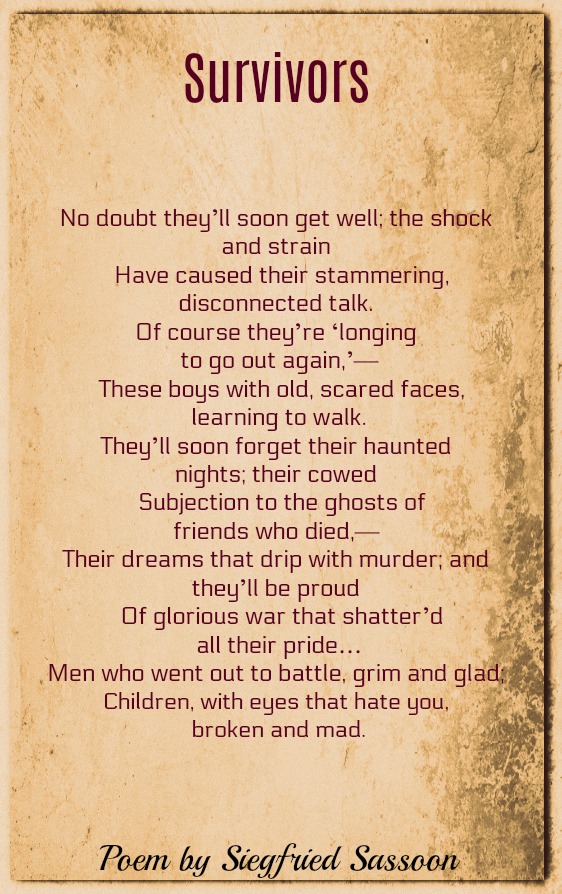
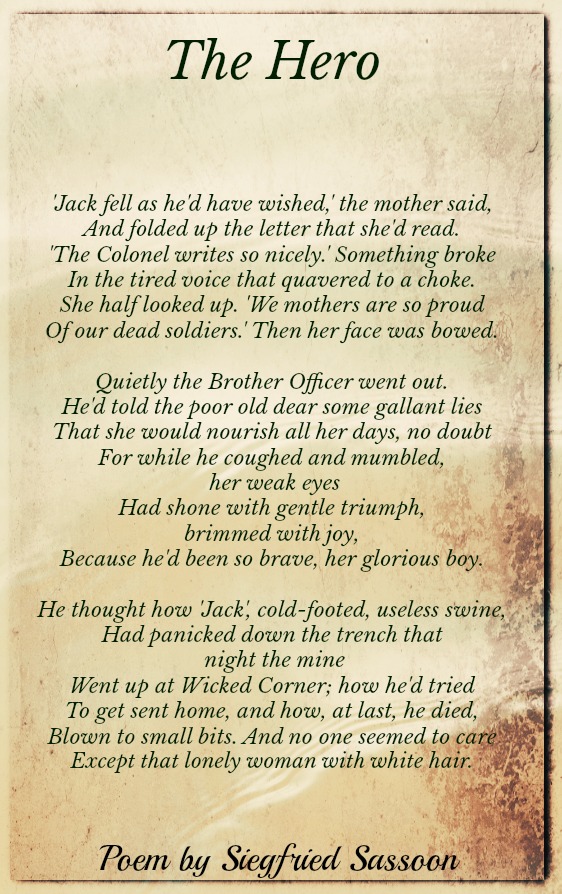
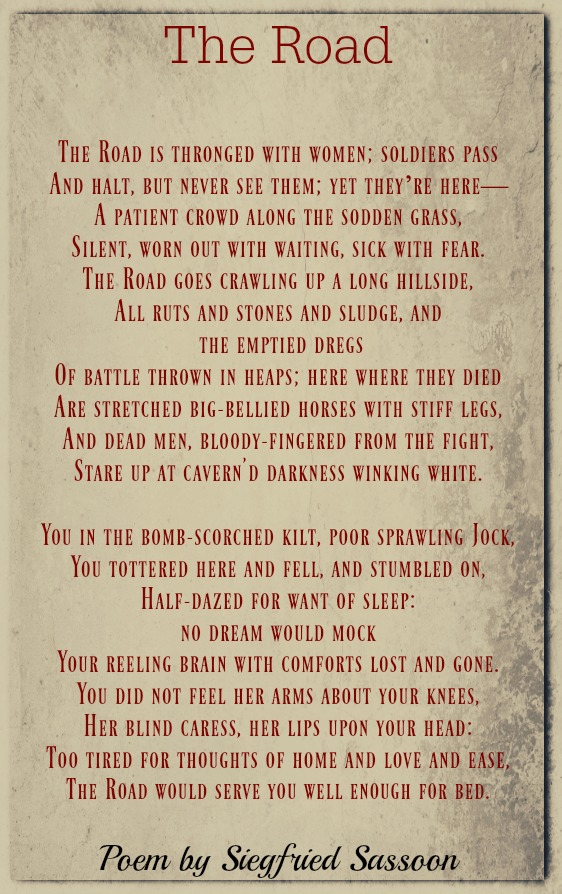
Ex-Service
Derision from the dead
Mocks armamental madness.
Redeem (each Ruler said)
Mankind. Men died to do it.
And some with glorying gladness
Bore arms for earth and bled:
But most went glumly through it
Dumbly doomed to rue it.
The darkness of their dying
Grows one with War recorded;
Whose swindled ghosts are crying
From shell-holes in the past,
Our deeds with lies were lauded,
Our bones with wrongs rewarded.
Dream voices these—denying
Dud laurels to the last.
Aftermath
Have you forgotten yet?…
For the world's events have rumbled on since those gagged days,
Like traffic checked while at the crossing of city-ways:
And the haunted gap in your mind has filled with thoughts that flow
Like clouds in the lit heaven of life; and you're a man reprieved to go,
Taking your peaceful share of Time, with joy to spare.
But the past is just the same—and War's a bloody game…
Have you forgotten yet?…
Look down, and swear by the slain of the War that you'll never forget.
Do you remember the dark months
you held the sector at Mametz—
The nights you watched and wired and
dug and piled sandbags on parapets?
Do you remember the rats; and the stench
Of corpses rotting in front of the front-line trench—
And dawn coming, dirty-white, and chill with a hopeless rain?
Do you ever stop and ask, 'Is it all going to happen again?'
Do you remember that hour of din before the attack—
And the anger, the blind compassion that seized and shook you then
As you peered at the doomed and haggard faces of your men?
Do you remember the stretcher-cases lurching back
With dying eyes and lolling heads—those ashen-grey
Masks of the lads who once were keen and kind and gay?
Have you forgotten yet?…
Look up, and swear by the green of the spring that you'll never forget.
Memorial Tablet
Squire nagged and bullied till I went to fight,
(Under Lord Derby’s Scheme). I died in hell—
(They called it Passchendaele). My wound was slight,
And I was hobbling back; and then a shell
Burst slick upon the duck-boards: so I fell
Into the bottomless mud, and lost the light.
At sermon-time, while Squire is in his pew,
He gives my gilded name a thoughtful stare:
For, though low down upon the list, I’m there;
‘In proud and glorious memory’… that’s my due.
Two bleeding years I fought in France, for Squire:
I suffered anguish that he’s never guessed.
Once I came home on leave: and then went west…
What greater glory could a man desire?
On Passing The New Menin Gate
Who will remember, passing through this Gate,
the unheroic dead who fed the guns?
Who shall absolve the foulness of their fate,-
Those doomed, conscripted, unvictorious ones?
Crudely renewed, the Salient holds its own.
Paid are its dim defenders by this pomp;
Paid, with a pile of peace-complacent stone,
The armies who endured that sullen swamp.
Here was the world's worst wound. And here with pride
'Their name liveth for ever', the Gateway claims.
Was ever an immolation so belied
as these intolerably nameless names?
Well might the Dead who struggled in the slime
Rise and deride this sepulchre of crime.
Concert Party
(EGYPTIAN BASE CAMP)
They are gathering round….
Out of the twilight; over the grey-blue sand,
Shoals of low-jargoning men drift inward to the sound—
The jangle and throb of a piano… tum-ti-tum…
Drawn by a lamp, they come
Out of the glimmering lines of their tents, over the shuffling sand.
O sing us the songs, the songs of our own land,
You warbling ladies in white.
Dimness conceals the hunger in our faces,
This wall of faces risen out of the night,
These eyes that keep their memories of the places
So long beyond their sight.
Jaded and gay, the ladies sing; and the chap in brown
Tilts his grey hat; jaunty and lean and pale,
He rattles the keys… some actor-bloke from town…
God send you home; and then A long, long trail;
I hear you calling me; and Dixieland….
Sing slowly… now the chorus… one by one
We hear them, drink them; till the concert’s done.
Silent, I watch the shadowy mass of soldiers stand.
Silent, they drift away, over the glimmering sand.
Break Of Day
There seemed a smell of autumn in the air
At the bleak end of night; he shivered there
In a dank, musty dug-out where he lay,
Legs wrapped in sand-bags,—lumps of chalk and clay
Spattering his face. Dry-mouthed, he thought, ‘To-day
We start the damned attack; and, Lord knows why,
Zero’s at nine; how bloody if I’m done in
Under the freedom of that morning sky!’
And then he coughed and dozed, cursing the din.
Was it the ghost of autumn in that smell
Of underground, or God’s blank heart grown kind,
That sent a happy dream to him in hell?—
Where men are crushed like clods, and crawl to find
Some crater for their wretchedness; who lie
In outcast immolation, doomed to die
Far from clean things or any hope of cheer,
Cowed anger in their eyes, till darkness brims
And roars into their heads, and they can hear
Old childish talk, and tags of foolish hymns.
He sniffs the chilly air; (his dreaming starts),
He’s riding in a dusty Sussex lane
In quiet September; slowly night departs;
And he’s a living soul, absolved from pain.
Beyond the brambled fences where he goes
Are glimmering fields with harvest piled in sheaves,
And tree-tops dark against the stars grown pale;
Then, clear and shrill, a distant farm-cock crows;
And there’s a wall of mist along the vale
Where willows shake their watery-sounding leaves,
He gazes on it all, and scarce believes
That earth is telling its old peaceful tale;
He thanks the blessed world that he was born…
Then, far away, a lonely note of the horn.
They’re drawing the Big Wood! Unlatch the gate,
And set Golumpus going on the grass;
He knows the corner where it’s best to wait
And hear the crashing woodland chorus pass;
The corner where old foxes make their track
To the Long Spinney; that’s the place to be.
The bracken shakes below an ivied tree,
And then a cub looks out; and ‘Tally-o-back!’
He bawls, and swings his thong with volleying crack,—
All the clean thrill of autumn in his blood,
And hunting surging through him like a flood
In joyous welcome from the untroubled past;
While the war drifts away, forgotten at last.
Now a red, sleepy sun above the rim
Of twilight stares along the quiet weald,
And the kind, simple country shines revealed
In solitudes of peace, no longer dim.
The old horse lifts his face and thanks the light,
Then stretches down his head to crop the green.
All things that he has loved are in his sight;
The places where his happiness has been
Are in his eyes, his heart, and they are good.
. . . .
Hark! there’s the horn: they’re drawing the Big Wood.
Enemies
He stood alone in some queer sunless place
Where Armageddon ends. Perhaps he longed
For days he might have lived; but his young face
Gazed forth untroubled: and suddenly there thronged
Round him the hulking Germans that I shot
When for his death my brooding rage was hot.
He stared at them, half-wondering; and then
They told him how I’d killed them for his sake—
Those patient, stupid, sullen ghosts of men;
And still there seemed no answer he could make.
At last he turned and smiled. One took his hand
Because his face could make them understand.
The Triumph
When life was a cobweb of stars for Beauty who came
In the whisper of leaves or a bird's lone cry in the glen,
On dawn-lit hills and horizons girdled with flame
I sought for the triumph that troubles the faces of men.
With death in the terrible flickering gloom of the fight
I was cruel and fierce with despair; I was naked and bound;
was stricken: and Beauty returned through the shambles of night;
In the faces of men she returned; and their triumph I found.
'They'
The Bishop tells us: 'When the boys come back
'They will not be the same; for they'll have fought
'In a just cause: they lead the last attack
'On Anti-Christ; their comrades' blood has bought
'New right to breed an honourable race,
'They have challenged Death and dared him face to face.'
'We're none of us the same!' the boys reply.
'For George lost both his legs; and Bill's stone blind;
'Poor Jim's shot through the lungs and like to die;
'And Bert's gone syphilitic: you'll not find
'A chap who's served that hasn't found some change.
' And the Bishop said: 'The ways of God are strange!'
Song-Books Of The War
In fifty years, when peace outshines
Remembrance of the battle lines,
Adventurous lads will sigh and cast
Proud looks upon the plundered past.
On summer morn or winter's night,
Their hearts will kindle for the fight,
Reading a snatch of soldier-song,
Savage and jaunty, fierce and strong;
And through the angry marching rhymes
Of blind regret and haggard mirth,
They'll envy us the dazzling times
When sacrifice absolved our earth.
Some ancient man with silver locks
Will lift his weary face to say:
'War was a fiend who stopped our clocks
Although we met him grim and gay.'
And then he'll speak of Haig's last drive,
Marvelling that any came alive
Out of the shambles that men built
And smashed, to cleanse the world of guilt.
But the boys, with grin and sidelong glance,
Will think, 'Poor grandad's day is done.'
And dream of lads who fought in France
And lived in time to share the fun.
Atrocities
You told me, in your drunken-boasting mood,
How once you butchered prisoners. That was good!
I'm sure you felt no pity while they stood
Patient and cowed and scared, as prisoners should.
How did you do them in? Come, don't be shy:
You know I love to hear how Germans die,
Downstairs in dug-outs. "Camerad!" they cry;
Then squeal like stoats when bombs begin to fly.
And you? I know your record. You went sick
When orders looked unwholesome: then, with trick
And lie, you wangled home. And here you are,
Still talking big and boozing in a bar.
How To Die
Dark clouds are smouldering into red
While down the craters morning burns.
The dying soldier shifts his head
To watch the glory that returns;
He lifts his fingers toward the skies
Where holy brightness breaks in flame;
Radiance reflected in his eyes,
And on his lips a whispered name.
You’d think, to hear some people talk,
That lads go West with sobs and curses,
And sullen faces white as chalk,
Hankering for wreaths and tombs and hearses.
But they’ve been taught the way to do it
Like Christian soldiers; not with haste
And shuddering groans; but passing through it
With due regard for decent taste.
At Carnoy
Down in the hollow there’s the whole Brigade
Camped in four groups: through twilight falling slow
I hear a sound of mouth-organs, ill-played,
And murmur of voices, gruff, confused, and low.
Crouched among thistle-tufts I’ve watched the glow
Of a blurred orange sunset flare and fade;
And I’m content. To-morrow we must go
To take some cursèd Wood… O world God made!
The Kiss
To these I turn, in these I trust;
Brother Lead and Sister Steel.
To his blind power I make appeal;
I guard her beauty clean from rust.
He spins and burns and loves the air,
And splits a skull to win my praise;
But up the noble marching days
She glitters naked, cold and fair.
Sweet Sister, grant your soldier this;
That in good fury he may feel
The body where he sets his heel
Quail from your downward darting kiss.
Absolution
The anguish of the earth absolves our eyes
Till beauty shines in all that we can see.
War is our scourge; yet war has made us wise,
And, fighting for our freedom, we are free.
Horror of wounds and anger at the foe,
And loss of things desired; all these must pass.
We are the happy legion, for we know
Time’s but a golden wind that shakes the grass.
There was an hour when we were loth to part
From life we longed to share no less than others.
Now, having claimed this heritage of heart,
What need we more, my comrades and my brothers?
Glory Of Women
You love us when we're heroes, home on leave,
Or wounded in a mentionable place.
You worship decorations; you believe
That chivalry redeems the war's disgrace.
You make us shells. You listen with delight,
By tales of dirt and danger fondly thrilled.
You crown our distant ardours while we fight,
And mourn our laurelled memories when we're killed.
You can't believe that British troops 'retire'
When hell's last horror breaks them, and they run,
Trampling the terrible corpses—blind with blood.
O German mother dreaming by the fire,
While you are knitting socks to send your son
His face is trodden deeper in the mud.
At The Cenotaph
I saw the Prince of Darkness, with his Staff,
Standing bare-headed by the Cenotaph:
Unostentatious and respectful, there
He stood, and offered up the following prayer.
'Make them forget, O Lord, what this Memorial
Means; their discredited ideas revive;
Breed new belief that War is purgatorial
Proof of the pride and power of being alive;
Men's biologic urge to readjust
The Map of Europe, Lord of Hosts, increase;
Lift up their hearts in large destructive lust;
And crown their heads with blind vindictive Peace.'
The Prince of Darkness to the Cenotaph
Bowed. As he walked away I heard him laugh.
In Barracks
The barrack-square, washed clean with rain,
Shines wet and wintry-grey and cold.
Young Fusiliers, strong-legged and bold,
March and wheel and march again.
The sun looks over the barrack gate,
Warm and white with glaring shine,
To watch the soldiers of the Line
That life has hired to fight with fate.
Fall out: the long parades are done.
Up comes the dark; down goes the sun.
The square is walled with windowed light.
Sleep well, you lusty Fusiliers;
Shut your brave eyes on sense and sight,
And banish from your dreamless ears
The bugle’s dying notes that say,
‘Another night; another day.’
To My Brother
Give me your hand, my brother, search my face;
Look in these eyes lest I should think of shame;
For we have made an end of all things base.
We are returning by the road we came.
Your lot is with the ghosts of soldiers dead,
And I am in the field where men must fight.
But in the gloom I see your laurell’d head
And through your victory I shall win the light.
Thrushes
Tossed on the glittering air they soar and skim,
Whose voices make the emptiness of light
A windy palace. Quavering from the brim
Of dawn, and bold with song at edge of night,
They clutch their leafy pinnacles and sing
Scornful of man, and from his toils aloof
Whose heart's a haunted woodland whispering;
Whose thoughts return on tempest-baffled wing;
Who hears the cry of God in everything,
And storms the gate of nothingness for proof.
The Fathers
Snug at the club two fathers sat,
Gross, goggle-eyed, and full of chat.
One of them said: ‘My eldest lad
Writes cheery letters from Bagdad.
But Arthur’s getting all the fun
At Arras with his nine-inch gun.’
‘Yes,’ wheezed the other, ‘that’s the luck!
My boy’s quite broken-hearted, stuck
In England training all this year.
Still, if there’s truth in what we hear,
The Huns intend to ask for more
Before they bolt across the Rhine.’
I watched them toddle through the door—
These impotent old friends of mine.
Banishment
I am banished from the patient men who fight
They smote my heart to pity, built my pride.
Shoulder to aching shoulder, side by side,
They trudged away from life’s broad wealds of light.
Their wrongs were mine; and ever in my sight
They went arrayed in honour. But they died,—
Not one by one: and mutinous I cried
To those who sent them out into the night.
The darkness tells how vainly I have striven
To free them from the pit where they must dwell
In outcast gloom convulsed and jagged and riven
By grappling guns. Love drove me to rebel.
Love drives me back to grope with them through hell;
And in their tortured eyes I stand forgiven.
Sick Leave
When I’m asleep, dreaming and lulled and warm,—
They come, the homeless ones, the noiseless dead.
While the dim charging breakers of the storm
Bellow and drone and rumble overhead,
Out of the gloom they gather about my bed.
They whisper to my heart; their thoughts are mine.
‘Why are you here with all your watches ended?
From Ypres to Frise we sought you in the Line.’
In bitter safety I awake, unfriended;
And while the dawn begins with slashing rain
I think of the Battalion in the mud.
‘When are you going out to them again?
Are they not still your brothers through our blood?’
Reconciliation
When you are standing at your hero’s grave,
Or near some homeless village where he died,
Remember, through your heart’s rekindling pride,
The German soldiers who were loyal and brave.
Men fought like brutes; and hideous things were done;
And you have nourished hatred, harsh and blind.
But in that Golgotha perhaps you’ll find
The mothers of the men who killed your son.
The Dragon And The Undying
All night the flares go up; the Dragon sings
And beats upon the dark with furious wings;
And, stung to rage by his own darting fires,
Reaches with grappling coils from town to town;
He lusts to break the loveliness of spires,
And hurls their martyred music toppling down.
Yet, though the slain are homeless as the breeze,
Vocal are they, like storm-bewilder'd seas.
Their faces are the fair, unshrouded night,
And planets are their eyes, their ageless dreams.
Tenderly stooping earthward from their height,
They wander in the dusk with chanting streams,
And they are dawn-lit trees, with arms up-flung,
To hail the burning heavens they left unsung.
Bombardment
Four days the earth was rent and torn
By bursting steel,
The houses fell about us;
Three nights we dared not sleep,
Sweating, and listening for the imminent crash
Which meant our death.
The fourth night every man,
Nerve-tortured, racked to exhaustion,
Slept, muttering and twitching,
While the shells crashed overhead.
The fifth day there came a hush;
We left our holes
And looked above the wreckage of the earth
To where the white clouds moved in silent lines
Across the untroubled blue.
Ancient History
Adam, a brown old vulture in the rain,
Shivered below his wind-whipped olive-trees;
Huddling sharp chin on scarred and scraggy knees,
He moaned and mumbled to his darkening brain;
‘He was the grandest of them all was Cain!
‘A lion laired in the hills, that none could tire:
‘Swift as a stag: a stallion of the plain,
‘Hungry and fierce with deeds of huge desire.’
Grimly he thought of Abel, soft and fair
A lover with disaster in his face,
And scarlet blossom twisted in bright hair.
‘Afraid to fight; was murder more disgrace?’
‘God always hated Cain’ He bowed his head
The gaunt wild man whose lovely sons were dead.
|
|
